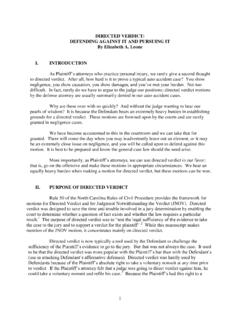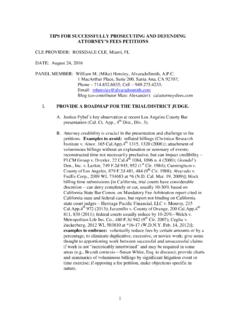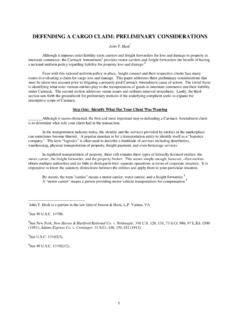Transcription of Journal of Experimental Social Psychology
1 Journal of Experimental Social Psychology 48 (2012) 165 179. Contents lists available at SciVerse ScienceDirect Journal of Experimental Social Psychology Journal homepage: Status incongruity and backlash effects: defending the gender hierarchy motivates prejudice against female leaders Laurie A. Rudman a, , Corinne A. Moss-Racusin b, Julie E. Phelan c, Sanne Nauts d a Rutgers University New Brunswick, USA. b Yale University, USA. c Langer Research Associates, USA. d Behavioural Science Institute, Radboud University Nijmegen, Netherlands a r t i c l e i n f o a b s t r a c t Article history: Agentic female leaders risk Social and economic penalties for behaving counter-stereotypically ( , backlash;. Received 10 April 2011 Rudman, 1998), but what motivates prejudice against female leaders? The status incongruity hypothesis Revised 30 August 2011 (SIH) proposes that agentic women are penalized for status violations because doing so defends the gender Available online 15 October 2011.
2 Hierarchy. Consistent with this view, Study 1 found that women are proscribed from dominant, high status displays (which are reserved for leaders and men); Studies 2 3 revealed that prejudice against agentic fe- Keywords: Backlash effect male leaders was mediated by a dominance penalty; and in Study 3, participants' gender system-justifying Sex discrimination beliefs moderated backlash effects. Study 4 found that backlash was exacerbated when perceivers were Gender stereotype primed with a system threat. Study 5 showed that only female leaders who threatened the status quo suf- Gender prejudice fered sabotage. In concert, support for the SIH suggests that backlash functions to preserve male dominance System justi cation theory by reinforcing a double standard for power and control. Impression management 2011 Elsevier Inc.
3 All rights reserved. Introduction respected and being liked, which undermines their ability to obtain po- sitions of status and power ( , Catalyst, 2010; Eagly & Karau, 2002;. Professional women vying for leadership roles face a double bind. In Rudman & Glick, 2008; Valian, 1999). order to be perceived as quali ed, they must defeat gender stereotypes In their role congruity theory of prejudice toward female leaders by presenting themselves as competent, con dent, and assertive ( , (RCT), Eagly and Karau (2002) posit that the two hurdles for profes- agentic; Dodge, Gilroy, & Fenzel, 1995; Eagly & Karau, 2002; Glick, sional women stem from a perceived con ict between leadership Zion, & Nelson, 1988). Thus, women's rst hurdle to leadership is the roles and women's gender roles. However, RCT is limited in scope lack of t between feminine stereotypes and leadership qualities for three reasons.
4 First, RCT does not account for evidence that agentic (Biernat & Fuegen, 2001; Foschi, 2000; Heilman, 1983). However, al- women suffer backlash even when they are not in leadership posi- though women can clear this hurdle by demonstrating agency, they tions ( , Rudman, 1998; Rudman & Fairchild, 2004), or for the fact still face another roadblock. This second hurdle consists of backlash, that atypical men are also at risk ( , Moss-Racusin, Phelan, & Rudman, whereby agentic women are perceived as highly capable, but risk prej- 2010; Rudman & Fairchild, 2004). Second, Eagly and Karau broadly de- udice and hiring discrimination for behaving counterstereotypically ned gender roles as people's consensual beliefs about the attributes of (Rudman, 1998). Speci cally, backlash emerges when agentic women women and men (p. 574), without stipulating which aspects of gender are judged as similarly competent, but less likable and hirable, com- roles are culpable in backlash.
5 Third, RCT does not specify perceivers'. pared with identically behaving men. This dilemma represents a motives for engaging in backlash. According to Rudman and Fairchild Catch-22 for women, such that they must enact agency to be perceived (2004), penalizing atypical targets is not engaged in arbitrarily; there as quali ed for leadership, but risk penalties if they do so ( , Heilman must be justi cation for it. That is, people are viewed as deviant when & Okimoto, 2007; Heilman, Wallen, Fuchs, & Tamkins, 2004; Parks- they violate gender norms (Kobrynowicz & Biernat, 1998; Rudman &. Stamm, Heilman, & Hearns, 2008; Rudman, 1998; Rudman & Glick, Fairchild, 2004), but backlash only results if perceivers feel justi ed. 1999, 2001; for reviews, see Eagly & Karau, 2002; Rudman & Phelan, The present research was designed to specify the primary motive for 2008).
6 In essence, backlash forces women to choose between being backlash, and which gender norm violations are culpable. First, we de- scribe gender rules: gender stereotypes that stipulate how women and men should be (prescriptions), and how they should not be (proscrip- Corresponding author at: Department of Psychology , Tillett Hall, Rutgers, the State tions). Second, we consider the relationship between gender rules and University of New Jersey, 53 Avenue E, Piscataway, NJ 08854-8040, USA. status characteristics by presenting the results of a survey (Study 1). E-mail address: ( Rudman). Third, we introduce the status incongruity hypothesis, which proposes 0022-1031/$ see front matter 2011 Elsevier Inc. All rights reserved. 166 Rudman et al. / Journal of Experimental Social Psychology 48 (2012) 165 179. that women are penalized speci cally for status violations because and arrogant) traits reserved for leaders and men.
7 These ndings defending the gender hierarchy is a key motive for backlash. Finally, provide a key to the puzzle of which stereotypes are likely to be cul- we present four experiments that provide support for the status incon- pable in backlash against agentic women, and why. That is, they begin gruity hypothesis. to point toward status incongruities as a critical component of backlash. Gender stereotypes as gender rules The status incongruity hypothesis Gender stereotypes are not merely descriptive but also prescriptive, consisting of rules concerning how men and women should behave Researchers distinguish between status based on achievement (Eagly & Karau, 2002; Fiske, 1998; Fiske & Stevens, 1993). Agentic attri- (earning your way to the top) and ascribed status based on personal butes ( , assertive, competitive, and independent) are prescriptive for characteristics ( , sex, race, and age; Berger, Webster, Ridgeway, men, whereas communal attributes ( , warm, kind, and supportive) & Rosenholtz, 1986; Ridgeway, 2001; Ridgeway & Bourg, 2004).
8 Be- are prescriptive for women plausibly because agency is required for cause of their gender, women are automatically linked to low status leadership and career success, whereas communality is required for car- (Rudman & Kilianski, 2000) so much so that when they enter an oc- ing for the welfare of others (Burgess & Borgida, 1999; Eagly, 1987; cupation in large numbers, its prestige can drop signi cantly (Nieva &. Prentice & Carranza, 2002; Williams & Best, 1990). Gutek, 1981; Touhey, 1974). The status incongruity hypothesis (SIH). Gender rules also consist of proscribed characteristics, rules con- proposes that women who possess or pursue power are de facto sta- cerning how men and women should not behave. Proscriptions tus incongruent, but particularly when their behavior violates status are relatively negative qualities that are prohibited for only one gen- expectations.
9 Given that agency is high in status, female agency is dis- der. For example, dominant masculine traits ( , controlling and crepant with women's low ascribed status, and this status incongruity arrogant) are proscribed for women but tolerated for men, and elicits backlash. By exhibiting masculine competencies, agentic weak feminine traits ( , weak and naive) are proscribed for men women undermine the presumed differences between the genders, but tolerated for women (Prentice & Carranza, 2002). From these ex- and discredit the system in which men have more access to power amples, it seems likely that proscriptions serve to reinforce the gen- and resources for ostensibly legitimate reasons. That is, agentic der hierarchy ( , that men ought not to be weak because it is low women should incur penalties because they threaten the gender hier- in status and women ought not to be dominant because it is high in archy.)
10 As a result, women's perceived status violations (as opposed to status). Therefore, a consideration of how gender rules align with sta- any type of gender role violation) should account for backlash effects. tus characteristics should help to explain why agentic female leaders are perceived as highly competent but socially unattractive ( , why The dominance penalty they are respected but not liked; , Heilman et al., 2004; Rudman & According to Study 1, female dominance proscriptions are the Phelan, 2008). Given that women encounter backlash when they gender rules for women that are most strongly aligned with status have merely demonstrated agency (and not negative traits), what is and thus, reinforce the gender hierarchy. Therefore, agentic female it about competent, ambitious women that puts them at risk for Social leaders should be viewed as extreme on dominant traits ( , domi- rejection?






